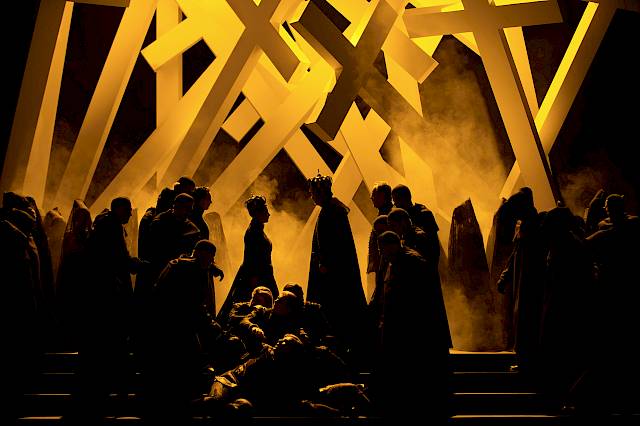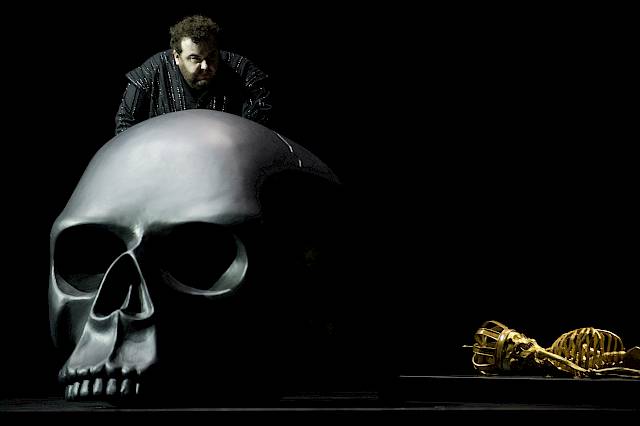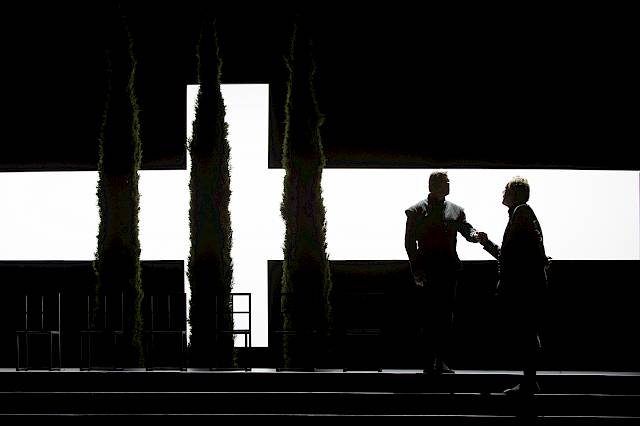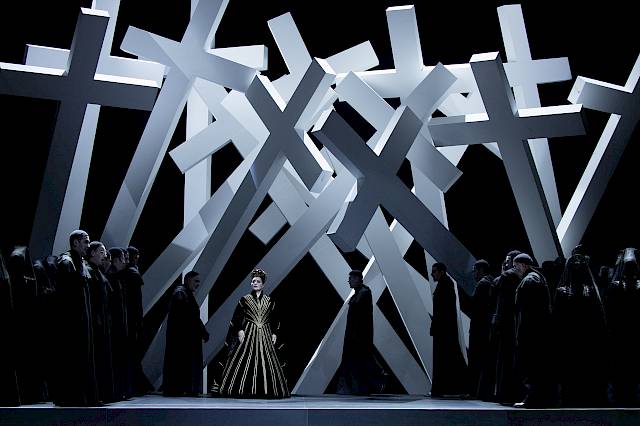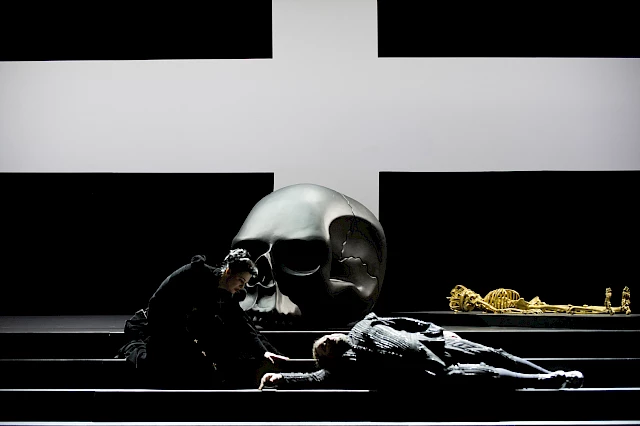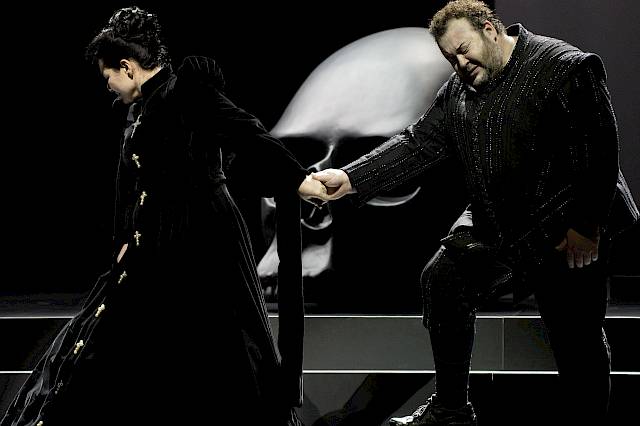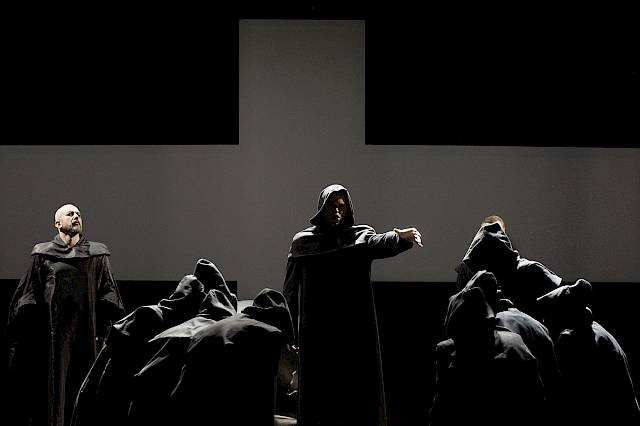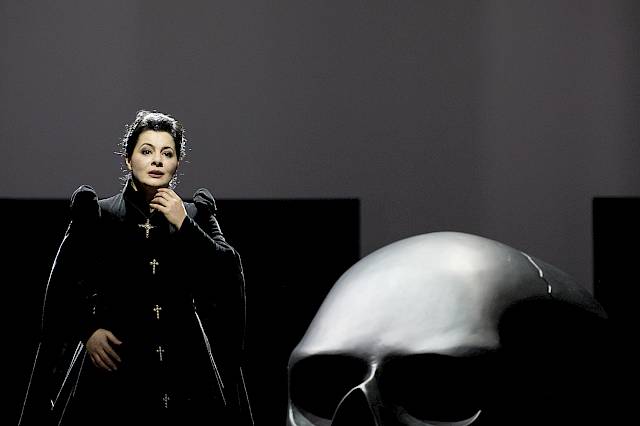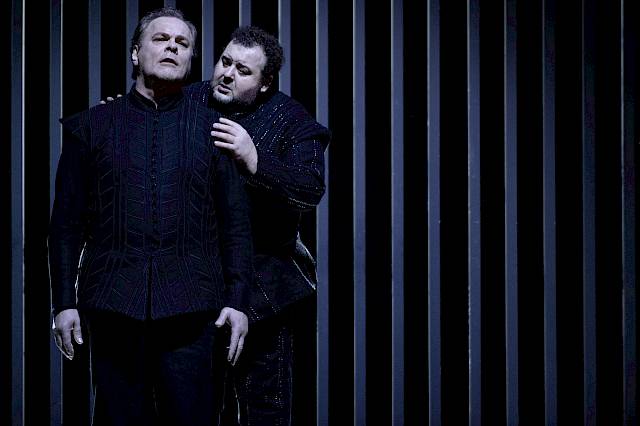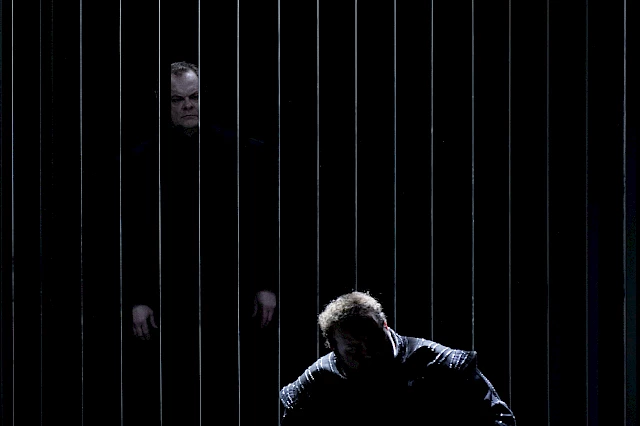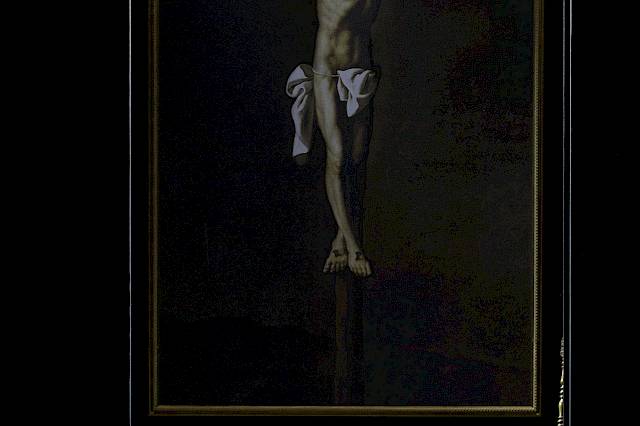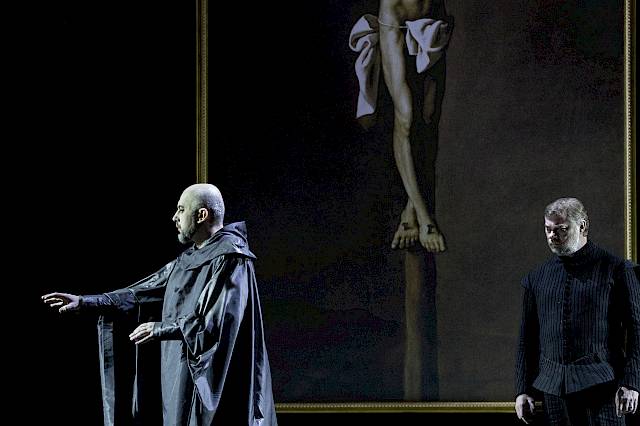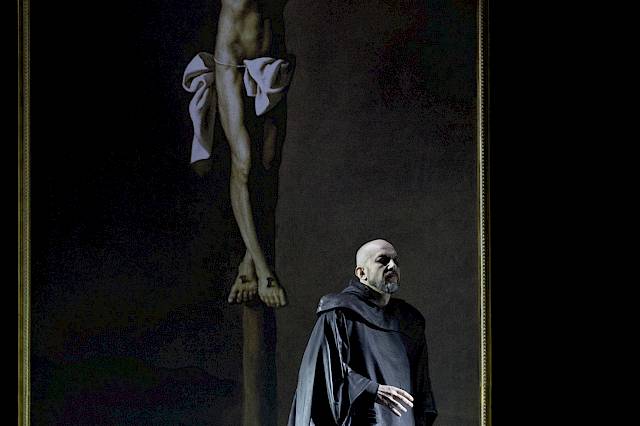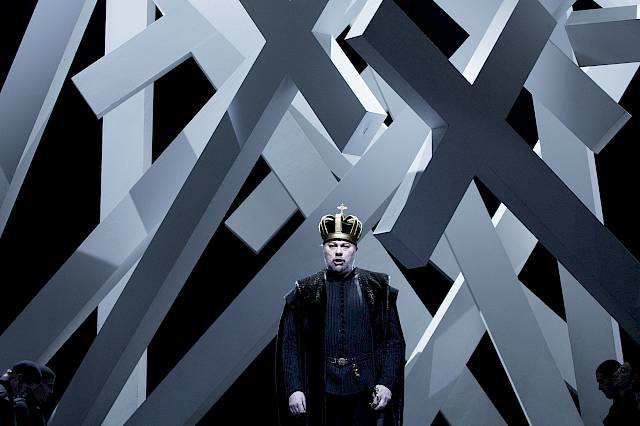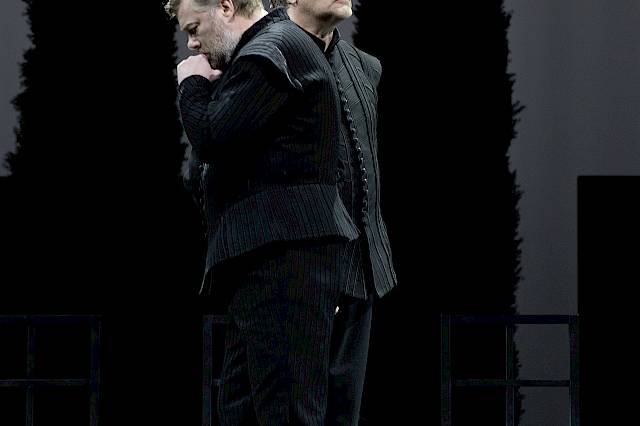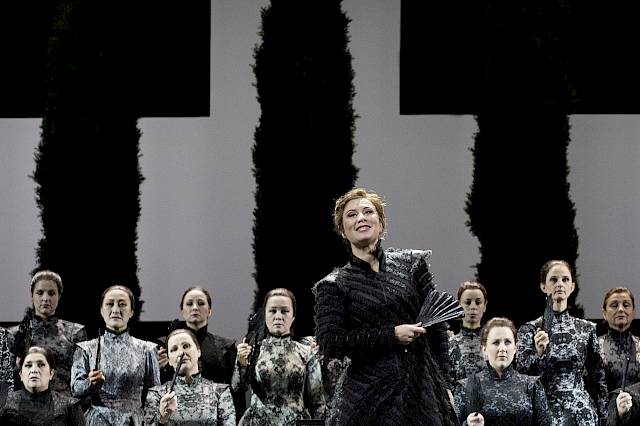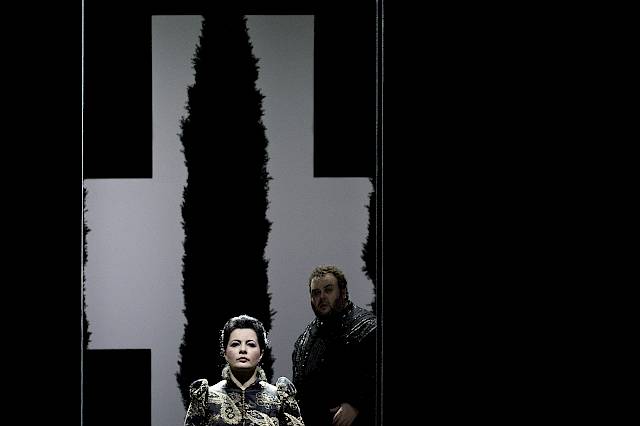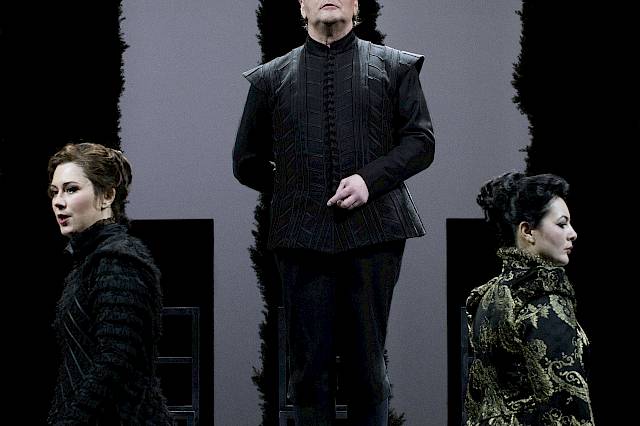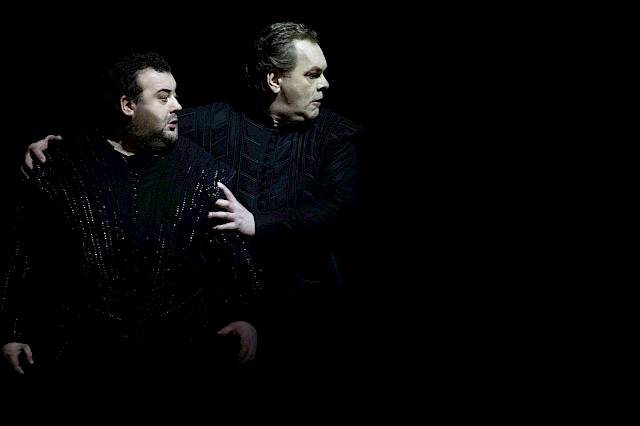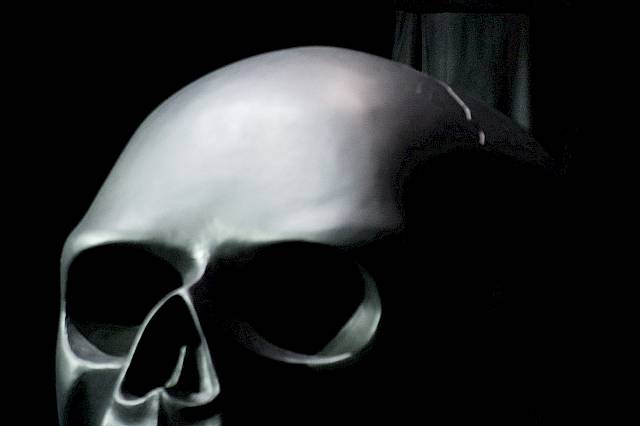Act One
In the cloisters of St. Just’s Monastery, some monks are praying at the tomb of Emperor Charles V. Realizing the vanity of all earthly matters, Charles had withdrawn to the monastery shortly before his death and handed over all powers in the empire he had created to his son Philip II. Carlos comes to his grandfather’s tomb in his attempts to overcome his forbidden love for Elisabeth, who is now queen and his stepmother. In doing so, he believes that he recognizes his grandfather in one of the monks. – Carlos tells Rodrigo, a boyhood friend who is now the Marquis of Posa, about his lost love. Rodrigo, who has just returned from Flanders, advises him to take on a great challenge to distract himself: saving the Spanish province of Flanders, where Philip is brutally putting down a rebellion linked to people turning to the Protestant faith. Carlos readily accepts, and the two friends swear an oath of eternal friendship and loyalty. When Philip and Elisabeth come out of the monastery, Rodrigo urges Carlos once again to devote his life to the cause of freedom.
Close by, Princess Eboli and the ladies of the court are waiting for the queen, who is the only woman permitted to enter the monastery. To pass the time, Eboli sings a highly suggestive song about a veil that inflames into love yet also conceals the truth. After Elisabeth has emerged, Rodrigo is announced. He presents the queen with a letter from her mother in France, and also urges her to receive Carlos. When Rodrigo describes Carlos’s dejection, Eboli concludes that she is the object of his desires. The queen agrees to see her stepson, and everyone else withdraws.
Carlos asks Elisabeth to persuade the king to send him to Flanders as regent. At the same time, though, their meeting reawakens his love. Only with great difficulty does Elisabeth retain her own composure and remind him that she is now his father’s wife. Carlos rushes out. – Philip enters to find Elisabeth alone – against all the court rules he has imposed. He turns on the Countess of Aremberg, a courtier who was supposed to have stayed with the queen, and orders her back to France. Elisabeth bids an emotional goodbye to her childhood friend, and begs her not to say anything about the insult she has just suffered when she arrives home.
The king is now left with Rodrigo, and engages him in conversation. Rodrigo takes advantage of this unexpected opportunity to describe the severity of the situation in Flanders. He urges Philip to give the Flemish their freedom instead of wreaking misery and death. The king is impressed at Rodrigo’s bold openness, but rejects his political view. He does make him his confidant, however, and tells him of his suspicions that Elisabeth is being unfaithful to him with his son Carlos. He instructs Rodrigo to keep an eye on them both; and he also warns Rodrigo about the Inquisition.
Act Two
Carlos meets Eboli at a nighttime garden party. Since Eboli has traded masks and costumes with the queen, Carlos assumes that it is Elisabeth he is talking to, and offers her a passionate declaration of his love. He realizes his mistake too late: Eboli now knows where his feelings really lie. Deeply offended, she vows revenge. Rodrigo, who has just arrived, sees the danger, and tells Carlos to hand him any incriminating papers he may have on him. Carlos hands them over – fully aware that Rodrigo is now a confidant of the king.
The people have gathered in the square in front of the cathedral to witness the public burning of heretics. The king and queen are also attending this auto-da-fé. Suddenly Carlos appears with a delegation of deputies from Flanders. He demands that Philip make him regent of the rebellious province. When Philip brusquely rejects the request, Carlos draws his dagger. Nobody dares to intervene: it is left to Rodrigo to disarm him. At this the king appoints Rodrigo a duke. As well as those already condemned, the deputies from Flanders are also led to the fire. A voice from Heaven promises them peace in God’s hands.
Act Three
Unable to sleep, Philip ponders his loneliness in his study. He is deeply troubled by Elisabeth’s lack of love for him. He calls for the Grand Inquisitor to assure himself that, were he to have his rebellious son executed, he would still enjoy the blessing of the church. The Grand Inquisitor, for his part, demands that Rodrigo be put to death, for his incendiary and heretical activities. When the king protests, the Inquisitor threatens to bring him, too, before the tribunal. Philip is forced to defer.
Elisabeth complains to her husband that someone has stolen her jewellery casket. Eboli has taken it and given it to the king. He opens it forcefully and finds a portrait of Carlos inside. When Philip accuses her of adultery and threatens to kill her, Elisabeth falls into a faint. Rodrigo and Eboli rush to assist. While Rodrigo reproaches the king for his lack of control, Eboli regrets her machinations. Elisabeth, for her part, can now think only of a life beyond.
Left alone with the queen, Princess Eboli confesses that she denounced her to Philip out of her own love for Carlos. When Eboli follows this by revealing that she is also the king’s lover, Elisabeth calls on her to choose between exile and a convent. Eboli curses her beauty and resolves to save Carlos.
Rodrigo goes in search of Carlos in prison, to say his farewells. Rodrigo has used the papers Carlos gave him to divert the suspicions of involvement in the Flanders insurrection onto himself. Rodrigo urges Carlos to continue the fight to liberate Flanders in his place. Then he is shot in the back by the Inquisition’s henchmen. As he dies, he tells Carlos that Elisabeth will be awaiting him at St. Just’s the next day.
The king comes to return Carlos’s dagger. But Carlos promptly incriminates himself by informing his deeply distressed father of Rodrigo’s sacrificial action. Meanwhile, the people have risen up to free Carlos from his custody. To the dismay of the grandees, the king orders the doors to be opened. In the ensuing mêlée, Eboli urges Carlos to flee. When the Grand Inquisitor appears, the uprising collapses: the people bow down once again to the Crown and the Church.
Act Four
Back at St. Just’s Monastery, Elisabeth is praying at Charles V’s tomb. All she seeks now is death. She says farewell to Carlos, who, to honour Rodrigo’s memory, has now resolved to renounce his love for her and fight for Flanders’ freedom. As Elisabeth and Carlos say goodbye, they are surprised by Philip and the Grand Inquisitor. Their execution seems inevitable. But then the mysterious monk with the voice of Charles V saves Carlos from earthly justice.


